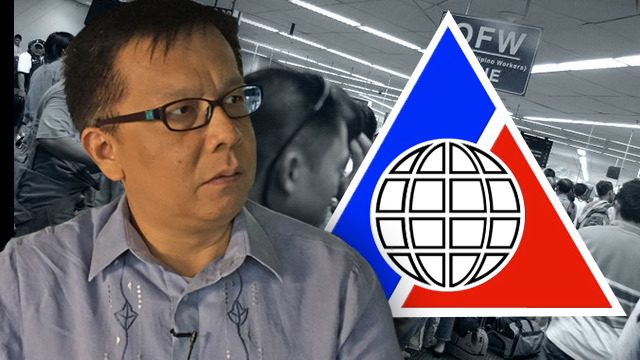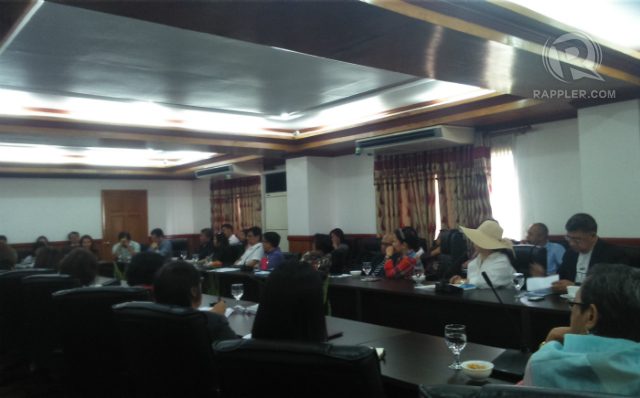SUMMARY
This is AI generated summarization, which may have errors. For context, always refer to the full article.

MANILA, Philippines – A dialogue led by the labor department on Friday, July 17, offered solutions to concerns raised by recruitment agencies that have banded together to seek the ouster of top labor officials.
Friday’s meeting at the Department of Labor and Employment’s main office opened initial discussions on how to address the concerns of the newly-formed Now or Never Movement (NNM), which is calling for the resignation of Philippine Overseas Employment Administration (POEA) Administrator Hans Leo Cacdac, and has also implicated Labor Secretary Rosalinda Baldoz.
The discussions sought to address the recruiters’ woes, including allowing agencies to renew their licenses after they agree on remedial action on deficiencies found during DOLE’s compliance assessment.
Other immediate solutions discussed include:
- Urging recruiters to apply for renewal way ahead of the expiration of their licenses
- Identifying labor regional directors who shut down branches of recruitment agencies without POEA’s imprimatur
- Providing rules for a mandatory conference prior to POEA’s issuance of preventive suspensions
- Conducting a joint walk-through of POEA processes to determine bottlenecks
NNM had cited alleged “hasty” and “disastrous” preventive suspensions and cancellations of agencies’ licenses. It said such government actions negatively impact the economy, its members’ employees, and other potential overseas Filipino workers whose applications have nothing to do with the agencies’ pending deficiencies.
Supporters of Cacdac, which included recruiters’ groups, trade unions, and civil society organizations, said the POEA was only imposing standards within the recruitment sector that would inevitably hurt non-compliant recruitment agencies. (READ: Recruiters divided over labor migration reforms)
Not all NNM member-recruiters attended the Friday dialogue, but NNM members at the meeting agreed to convey the policy efforts discussed to the rest of the group.
Following the dialogue, NNM’s legal counsel Steven Yanson, who did not attend the dialogue, said the group is shelving its July 20 protest, in view of the latest policy proposals.
Yanson also cited the planned notification to an agency prior to the repatriation of a worker it has deployed. This gives the agency a chance to be a partner in the rescue process.
“Ang ganda ng proposal… Patunay na matino and lehitimo ang panawagan (The proposals are good….Proof that our pleas are reasonable and legitimate),” he told Rappler in a phone interview Saturday, July 18.
Cacdac considered Friday’s discussion “fruitful,” saying recruiters, government, and civil society all have a common goal of protecting OFWs especially the more vulnerable household service workers (HSWs).
He stressed the importance of social consensus and acknowledged that there is “elbow room for discussion and flexibility on our part.”
The POEA is in charge of validating job orders from OFW destination countries, approving employee contacts of OFWs, and managing the licensing of recruitment agencies that deploy Filipino workers abroad, among others.
It also hears OFWs’ complaints against recruiters, foreign principals, and employers not involving money claims.
No negotiations prior to ouster calls
During the meeting, NNM’s Amanda Araneta agreed that similar talks in the future could help address many of the other recruiters’ concerns. She admitted that the group had failed to directly air their grievances to the government before organizing their planned protest.

Baldoz said the initial meeting was meant to “start with identifying the problems” raised by NNM, “looking jointly for solutions so that they also have an ownership on the solution.”
When policy solutions are born out of dialogue, she said these policies are “easy to implement” and involved parties are “ready to comply.”
Highlighting the value of industry-wide talks, the labor chief said her office is always open to listen to stakeholders’ concerns.
“We cannot estimate the value of tripartism and social dialogue especially here at the labor department where we are serving so many stakeholders, and we are also addressing concerns not just of domestic but even overseas workers,” Baldoz told Rappler.
“There is such a thing as once you are able to identify the problems correctly, it is 50% solved. And one way to do it is through a direct person-to-person dialogue with them, and that is what we did this morning,” she added.
Recruiters had mixed reactions to the discussion – some said they are happy about the outcome; others said they are not as they remain at a loss on the reasons behind NNM’s ouster calls.
A united front rallied behind Cacdac and Baldoz on the heels of NNM’s mobilization and questioned NNM’s “vested interests.” The group lamented the exclusion of pro-OFW organizations in Friday’s discussions.
Professionalized HSWs
There is strong multi-stakeholder support of Cacdac’s efforts to quell migrant worker mills and to ensure workers deployed abroad, especially HSWs, are qualified and well-trained.
Professionalizing HSWs is a shared interest, said Baldoz.
“Everybody would have to keep a certain standard to avoid cases of maltreatment, to avoid this negative mark when you are deploying domestic helpers,” she added.
Baldoz explained that HSWs are no longer as vulnerable in terms of their legal rights in the Philippines, but still face abuse at times due to factors inherent to domestic work.
“Certain peculiarities in their work setting still expose them to certain vulnerabilities, because they are not working in an establishment [or] in a company but a household where there is practically no support system,” she explained.
Earlier, DOLE cited government efforts such as the enforcement of a standard employment contract providing a monthly minimum wage of $400, the implementation of the no-placement-fee policy for HSWs, and the mandatory training of HSWs as probable causes of decline in the Philippines’ deployment.
The Philippines is a known labor exporter, making ethical recruitment of OFWs a priority.
While OFWs’ remittances boost the economy, President Benigno Aquino III has repeatedly said that he envisions “a government that creates jobs at home so that working abroad will be a choice rather than a necessity.” – Rappler.com
Add a comment
How does this make you feel?
There are no comments yet. Add your comment to start the conversation.